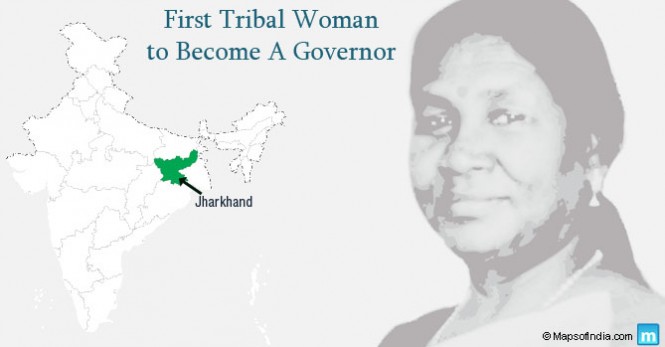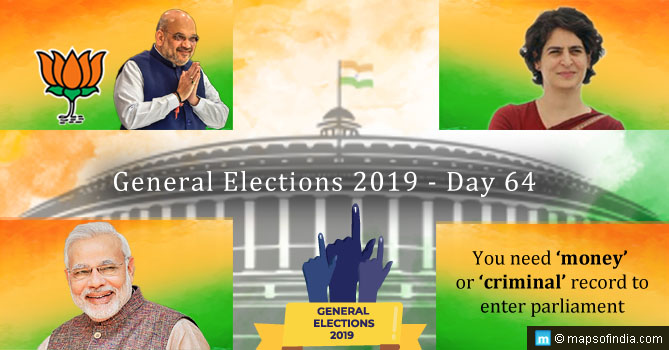 On 18 May 2015, Draupadi Murmu took oath as Jharkhand’s first tribal woman governor. Chief Justice of the Jharkhand High Court, Justice Virendra Singh administered the oath and the ceremony was attended by the Jharkhand Chief Minister Raghubar Das, Union Minister of State for Rural Development Sudarshan Bhagat and former Chief Ministers Arjun Munda and Shibu Soren, amongst a host of other dignitaries.
On 18 May 2015, Draupadi Murmu took oath as Jharkhand’s first tribal woman governor. Chief Justice of the Jharkhand High Court, Justice Virendra Singh administered the oath and the ceremony was attended by the Jharkhand Chief Minister Raghubar Das, Union Minister of State for Rural Development Sudarshan Bhagat and former Chief Ministers Arjun Munda and Shibu Soren, amongst a host of other dignitaries.
The appointment holds significance as Jharkhand being a 5th Schedule State, has tribals comprising around 26% of the population.
Ever since the state won its independence from Bihar, 15-year-old Jharkhand state has seen a lot of debate between the tribals and non-tribals over administrative control. The state is still to recover from the hotly contested debate that took place in the run-up to choosing a tribal vs non-tribal Chief Minister for the state. The tribals felt excluded when Raghubar Das, a non-tribal, was finally chosen as the Chief Minister. Since then, he has had been having a tough time keeping various tribal and non-tribal factions together and the main opposition party (JMM) at bay.
It is in this context that the appointment of 58-year-old Draupadi Murmu as the Governor of Jharkhand is being seen in political circles as a masterstroke. On one hand, it placates the tribal factions which were opposing Raghubar Das’ appointment as Chief Minister, and on the other it sends out a strong message to various tribal factions that their concerns will now find a voice in the incumbent governor.
Political Journey of Draupadi Murmu
While Draupadi Murmu is a tribal, she is actually an experienced politician from neighbouring Odisha. She was a minister in the coalition government of the BJP and the BJD (Biju Janata Dal) in Odisha between 2000 and 2004. She served as Minister of State with Independent Charge for Commerce and Transport from 6 March 2000 to 6 August 2002, and held the Fisheries and Animal Resources Development portfolio from 6 August 2002 to 16 May 2004.
The two-time legislator from Rairangpur assembly constituency in Odisha understands the issues concerning tribals and her experience as a politician will help her negotiate better with various factions during her tenure as a Governor of Jharkhand.
Additionally, as a governor of a 5th Schedule state, she enjoys additional powers to intervene on matters of tribal interest. This should go a long way in instilling confidence amongst the people that their voice will be heard in the right places.
Reservations Against Draupadi’s Appointment
However, not all are as optimistic about her appointment. Dr Harishwar Dayal, Director of Eastern Regional Centre of Institute of Human Index, has reportedly expressed his reservations. He questions how effective the governor is going to be, given their passive roles in most states. Similar sentiment was expressed by local tribal leader and ex-MLA Salkhan Murmu who was skeptical on how effective governors are in 5th Schedule States.
Understanding Tribal Alienation
To understand the significance of the creation of Jharkhand as a state and Draupadi Murmu’s appointment as the first tribal woman governor in India, one must try and get a perspective on the state of tribals in contemporary India. While the subject is deep and well beyond the scope of this space, it is nevertheless important to get a brief background on where they stand in India.
Very few in India would know that as per Census 2011, tribals form a majority of the population (above 60%) in Nagaland, Mizoram, Meghalaya, Arunachal Pradesh and Lakshadweep. 83.2% of the total tribal population is spread out between Madhya Pradesh, Jharkhand, Chhattisgarh, Odisha, Rajasthan, Maharashtra, Gujarat, Seemandhra & Telangana, Karnataka and West Bengal.
Contrary to common belief, tribals are not a homogenous group but vary distinctly in lifestyle, habits, rituals and appearance from place to place, community to community and therefore for a non-tribal to understand their varied lifestyles, beliefs and evolving needs, is indeed challenging.
In this context, the appointment of Draupadi Murmu, herself a tribal, becomes more than just a symbolic move. She could go well beyond playing the traditional role of a governor and become pro-active within the state, in ensuring that tribal welfare and development remain top priorities with the ruling administration. Upon her rests the responsibility of strengthening social and cultural fabric of Jharkhand and empowering women.





